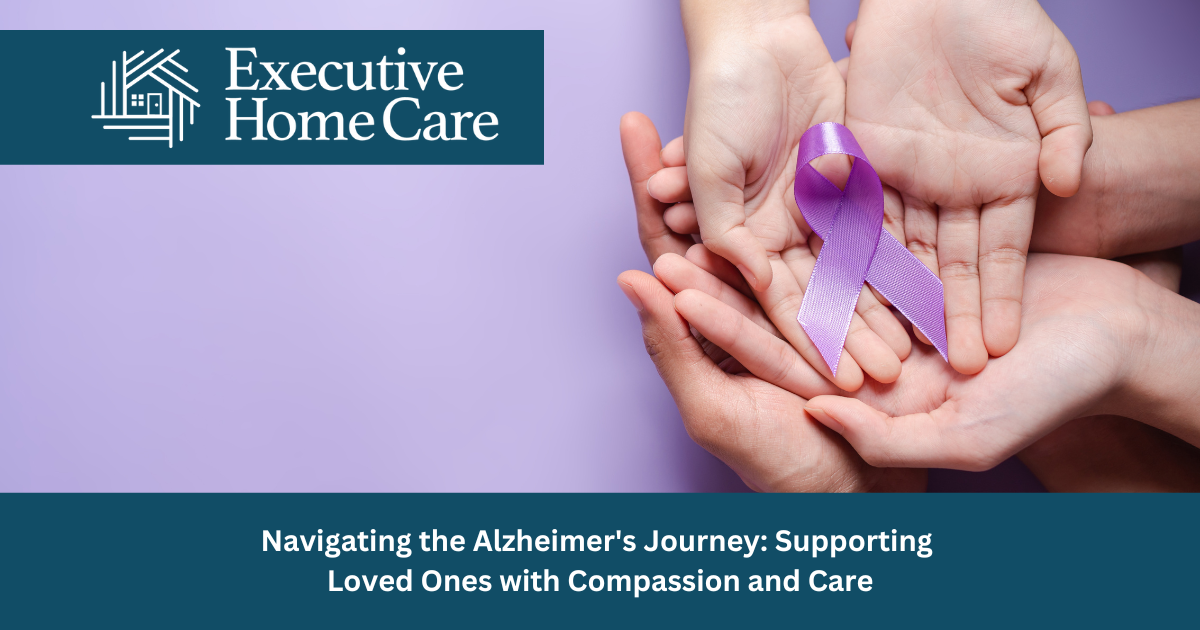Navigating the Alzheimer's Journey: Supporting Loved Ones with Compassion and Care
Executive Home Care: A Beacon of Support for Alzheimer’s Care
Navigating the challenges of Alzheimer’s disease is a demanding journey for both the patients and their caregivers. The Alzheimer’s Association reports that as of 2023, approximately 6.5 million Americans aged 65 and older are living with Alzheimer’s, a number projected to nearly double by 2050. Understanding how to support loved ones facing this condition is crucial in making their journey easier and more dignified.
Executive Home Care offers specialized care for individuals with Alzheimer’s and dementia, providing a range of services tailored to the specific stages of the disease. Our approach to Alzheimer’s care is comprehensive and compassionate, focusing on maximizing the independence of early-stage patients, offering consistent support during the mid-stage, and providing around-the-clock care in the late stages. The caregivers are trained to ensure the safety, comfort, and well-being of Alzheimer’s patients, adapting to the changing needs as the disease progresses. Executive Home Care’s commitment to personalized care plans and their understanding of the complexities of Alzheimer’s caregiving make them a valuable resource for families navigating this difficult journey.
Patience: A Cornerstone of Alzheimer’s Care
Patience is paramount when caring for someone with Alzheimer’s. The changes in cognitive function and behavior can be distressing and difficult to cope with. According to the Mayo Clinic, patience and understanding are vital in communicating effectively with Alzheimer’s patients. It’s important to recognize that the disease affects each person differently, and adjusting your expectations to the individual’s current abilities is key.
Effective Communication Strategies
Regular communication is essential but can be challenging as Alzheimer’s progresses. Johns Hopkins Medicine suggests simple, clear language and the use of nonverbal cues to aid understanding. Maintaining eye contact, speaking slowly, and using gestures can greatly improve communication. It’s also important to listen with empathy and offer reassurance, as individuals with Alzheimer’s often feel confused, anxious, or uncertain.
Creating a Safe and Familiar Environment
Safety is a major concern in Alzheimer’s care. The National Institute on Aging recommends making modifications to the home to create a safer environment. This can include removing tripping hazards, installing grab bars in critical areas, and ensuring the home is well-lit. Keeping the environment familiar and consistent can also help reduce anxiety and confusion for Alzheimer’s patients.
Emotional Support and Understanding
Understanding the emotional needs of someone with Alzheimer’s is just as important as attending to their physical safety. The Alzheimer’s Association emphasizes the importance of emotional support, recognizing that individuals with Alzheimer’s may experience a range of emotions, from confusion and frustration to sadness and anger. Being there to offer comfort, maintaining a routine, and engaging in activities they enjoy can provide a sense of stability and well-being.
The Role of Professional Caregiving and Support Groups
In many cases, the support of professional caregivers becomes necessary. These professionals are trained to handle the unique challenges of Alzheimer’s care, providing respite and support to families. Additionally, support groups can be invaluable resources for caregivers, offering a platform to share experiences, advice, and emotional support.
Caring for a loved one with Alzheimer’s is undoubtedly challenging, but it can also be an experience filled with moments of connection and deepening relationships. Patience, effective communication, a safe environment, and emotional support are key components in providing compassionate care. By coming together as a community and sharing knowledge and resources, we can make the Alzheimer’s journey a more navigable and compassionate experience for all involved.
